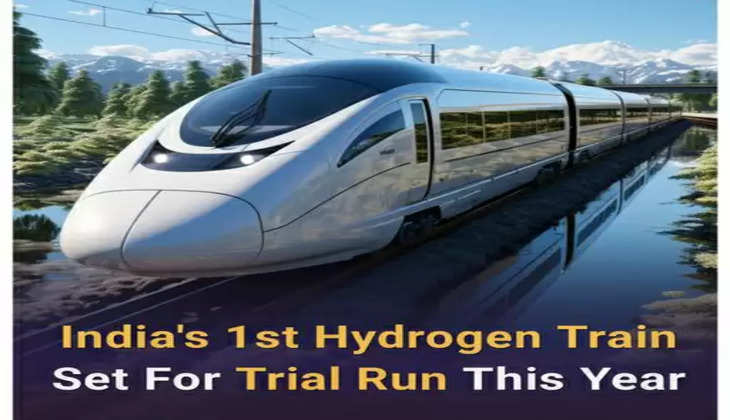India to Launch Hydrogen-Powered Trains: A Step Toward Zero Carbon Emissions

India is on the cusp of joining an elite group of nations that have adopted hydrogen-powered trains. This pioneering development comes as part of India’s broader commitment to reducing carbon emissions and promoting sustainable technologies. The initiative will make India one of the few countries—along with Germany, France, Sweden, and China—to integrate hydrogen into its railway infrastructure.
India’s First Hydrogen Train Set for December Launch
The Ministry of Railways has given the green light for a pilot project aimed at transforming the nation’s railways with cutting-edge hydrogen technology. The first hydrogen-powered train is expected to run on the Jind-Sonepat route in Haryana by December. This project will mark the beginning of India’s ambitious shift toward greener transportation alternatives. Senior railway officials confirmed that the assembly of the prototype hydrogen train is currently underway at the Integral Coach Factory in Chennai, which has been tasked with the project’s execution.
Railway Minister Ashwini Vaishnaw has been closely overseeing the project, emphasizing its importance not only for reducing the country’s carbon footprint but also for its potential to revolutionize railway operations across the country.
Hydrogen for Heritage: A Focus on Hill Regions
The ambitious project, dubbed the ‘Hydrogen for Heritage’ initiative, aims to introduce a total of 35 hydrogen-powered trains after the successful completion of the trial run. The first batch of these trains will primarily operate in heritage and hilly regions where traditional rail systems face challenges due to terrain and environmental constraints. These areas are often difficult to electrify, making hydrogen-powered trains an ideal solution to reduce pollution while maintaining efficient connectivity.
To support this initiative, the Indian Railways has earmarked significant investments. A budget of Rs 80 crore has been allocated for each hydrogen train, with an additional Rs 70 crore set aside for the necessary infrastructure development, such as hydrogen fueling stations and refueling infrastructure.
A Green Leap Toward Zero Carbon Emissions
This major leap toward hydrogen-powered transportation is part of India’s broader effort to achieve its goal of zero carbon emissions by 2030. The Indian Railways, one of the largest rail networks in the world, has been a major contributor to the country’s carbon emissions due to its reliance on diesel-powered trains. By shifting to hydrogen, which produces only water vapor as a byproduct, the railways hope to drastically reduce its greenhouse gas emissions and environmental impact.
Hydrogen-powered trains are seen as a cleaner and more sustainable alternative to diesel locomotives, especially in regions where electrification is not feasible due to technical or financial constraints. These trains will also help alleviate the growing pollution levels in urban and rural areas, as they emit no harmful pollutants or greenhouse gases.
Clearing the Regulatory Hurdles
To ensure the safe and efficient operation of hydrogen trains, the Indian Railways has also secured the necessary clearances from the Petroleum and Explosive Safety Organisation (PESO) for the construction of a hydrogen plant. This plant will be vital for the production and storage of hydrogen fuel, which will power the trains. The collaboration with PESO has been crucial to ensuring that all safety protocols are followed in handling and distributing hydrogen, a fuel known for its highly flammable properties.
Global Attention on India’s Hydrogen Future
India’s move to introduce hydrogen trains has garnered international attention, positioning the country as a key player in the global shift toward cleaner, more sustainable transportation solutions. This project not only demonstrates India’s commitment to sustainability but also showcases its growing technological prowess in the field of renewable energy and clean transport.
With the completion of this pilot project and subsequent rollout, India aims to pave the way for greater adoption of hydrogen technologies in other sectors, including buses and trucks, and continue its leadership role in the global clean energy transition.
In the coming months, as the first hydrogen-powered train takes to the tracks, it will represent a significant milestone for both India’s railway system and its environmental goals—paving the way for a greener, cleaner, and more sustainable future.
--

